天才与工匠
工匠精神的名人素材
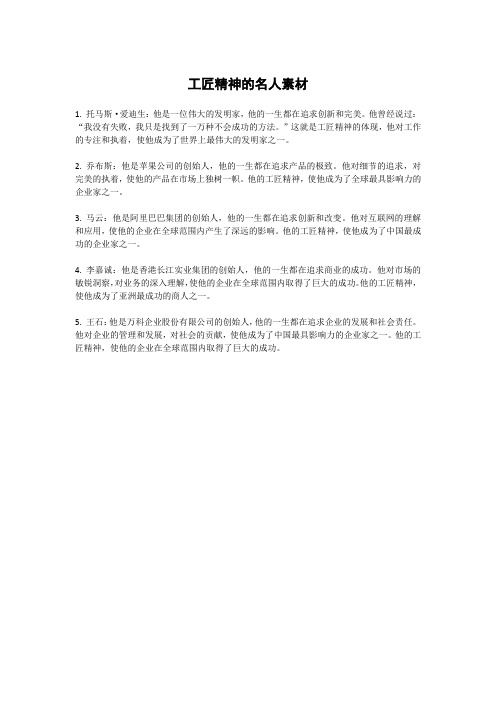
工匠精神的名人素材
1. 托马斯·爱迪生:他是一位伟大的发明家,他的一生都在追求创新和完美。
他曾经说过:“我没有失败,我只是找到了一万种不会成功的方法。
”这就是工匠精神的体现,他对工作的专注和执着,使他成为了世界上最伟大的发明家之一。
2. 乔布斯:他是苹果公司的创始人,他的一生都在追求产品的极致。
他对细节的追求,对完美的执着,使他的产品在市场上独树一帜。
他的工匠精神,使他成为了全球最具影响力的企业家之一。
3. 马云:他是阿里巴巴集团的创始人,他的一生都在追求创新和改变。
他对互联网的理解和应用,使他的企业在全球范围内产生了深远的影响。
他的工匠精神,使他成为了中国最成功的企业家之一。
4. 李嘉诚:他是香港长江实业集团的创始人,他的一生都在追求商业的成功。
他对市场的敏锐洞察,对业务的深入理解,使他的企业在全球范围内取得了巨大的成功。
他的工匠精神,使他成为了亚洲最成功的商人之一。
5. 王石:他是万科企业股份有限公司的创始人,他的一生都在追求企业的发展和社会责任。
他对企业的管理和发展,对社会的贡献,使他成为了中国最具影响力的企业家之一。
他的工匠精神,使他的企业在全球范围内取得了巨大的成功。
画家工匠精神的例子
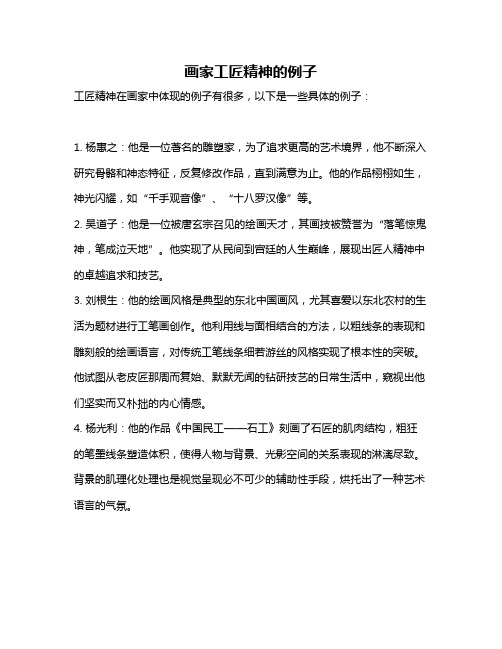
画家工匠精神的例子
工匠精神在画家中体现的例子有很多,以下是一些具体的例子:
1. 杨惠之:他是一位著名的雕塑家,为了追求更高的艺术境界,他不断深入研究骨骼和神态特征,反复修改作品,直到满意为止。
他的作品栩栩如生,神光闪耀,如“千手观音像”、“十八罗汉像”等。
2. 吴道子:他是一位被唐玄宗召见的绘画天才,其画技被赞誉为“落笔惊鬼神,笔成泣天地”。
他实现了从民间到宫廷的人生巅峰,展现出匠人精神中的卓越追求和技艺。
3. 刘根生:他的绘画风格是典型的东北中国画风,尤其喜爱以东北农村的生活为题材进行工笔画创作。
他利用线与面相结合的方法,以粗线条的表现和雕刻般的绘画语言,对传统工笔线条细若游丝的风格实现了根本性的突破。
他试图从老皮匠那周而复始、默默无闻的钻研技艺的日常生活中,窥视出他们坚实而又朴拙的内心情感。
4. 杨光利:他的作品《中国民工——石工》刻画了石匠的肌肉结构,粗狂的笔墨线条塑造体积,使得人物与背景、光影空间的关系表现的淋漓尽致。
背景的肌理化处理也是视觉呈现必不可少的辅助性手段,烘托出了一种艺术语言的气氛。
以上这些画家的例子都展现了工匠精神中的精益求精、追求卓越、不断探索和创新的品质。
他们的作品不仅具有极高的艺术价值,也代表了他们对于艺术和生活的执着追求和热爱。
工匠精神的名言名句

工匠精神的名言名句有:
1.匠心独运,精益求精。
——李廷珪
2.匠人,如果比别人做得更好,那他就是天才。
——福楼拜
3.欲从天下国家万事万物而学之,则汗漫九垓,遍游四宇尚已。
——魏源
4.专于业,精于艺。
——鲁迅
5.知者创物,巧者述之守之,世谓之工。
——《周礼》
6.匠人之心,念念不离物。
——佐藤可士和
7.工匠精神,不外乎对工作的执着、热爱和精益求精。
——吴晓
波
8.工匠精神是一种信仰,让产品精益求精、追求完美。
——乔布
斯
9.工匠之道,从不满足于现状,追求卓越,永不停息。
——稻盛
和夫
10.工艺之美,是良品中的良品。
——三宅一生。
天才与工匠课后题答案
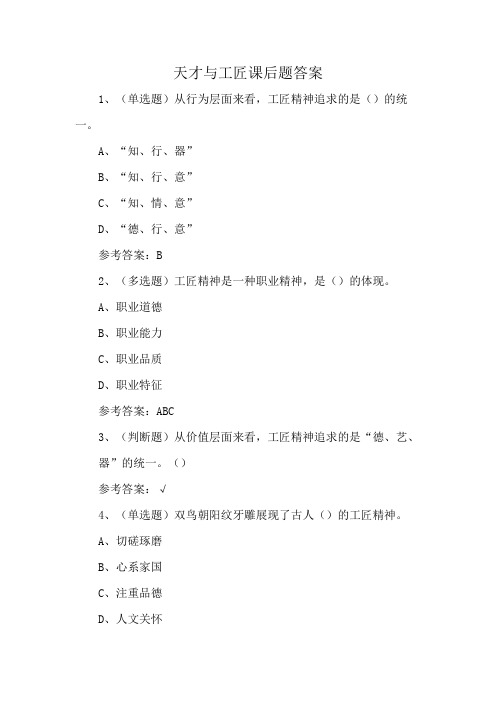
天才与工匠课后题答案
1、(单选题)从行为层面来看,工匠精神追求的是()的统一。
A、“知、行、器”
B、“知、行、意”
C、“知、情、意”
D、“德、行、意”
参考答案:B
2、(多选题)工匠精神是一种职业精神,是()的体现。
A、职业道德
B、职业能力
C、职业品质
D、职业特征
参考答案:ABC
3、(判断题)从价值层面来看,工匠精神追求的是“德、艺、
器”的统一。
()
参考答案:√
4、(单选题)双鸟朝阳纹牙雕展现了古人()的工匠精神。
A、切磋琢磨
B、心系家国
C、注重品德
D、人文关怀
参考答案:A
5、(多选题)工匠精神在我国的发展具有悠久的历史,从原始社会到现代社会,从(到()再到(),经历了一个漫长的演变过程。
A、早期萌芽
B、中期发展
C、后期传承
D、当代创新
参考答案:ABC
6、(单选题)第二次社会大分工,()从农业中脱离出来,出现了手艺人或者工匠。
A、养殖业
B、种植业
C、手工业
D、机械产业
参考答案:C
7、(单选题)《墨子救宋》的故事就充分展现了()思想。
A、兼爱非攻
B、切磋琢磨
C、实用主义
D、节约资源
参考答案:A。
工匠精神模范人物事迹
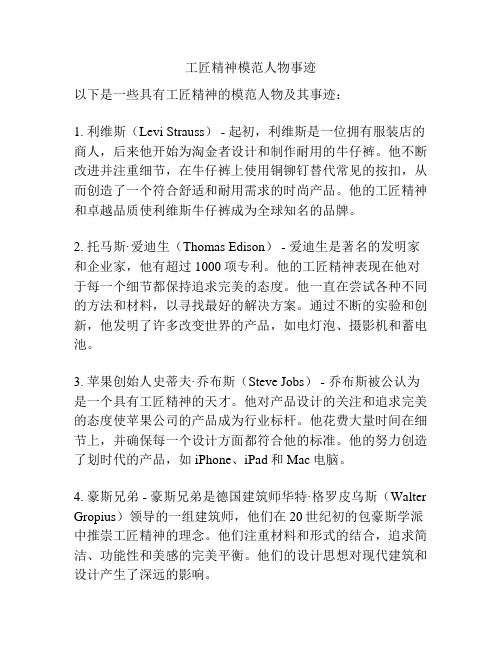
工匠精神模范人物事迹以下是一些具有工匠精神的模范人物及其事迹:1. 利维斯(Levi Strauss) - 起初,利维斯是一位拥有服装店的商人,后来他开始为淘金者设计和制作耐用的牛仔裤。
他不断改进并注重细节,在牛仔裤上使用铜铆钉替代常见的按扣,从而创造了一个符合舒适和耐用需求的时尚产品。
他的工匠精神和卓越品质使利维斯牛仔裤成为全球知名的品牌。
2. 托马斯·爱迪生(Thomas Edison) - 爱迪生是著名的发明家和企业家,他有超过1000项专利。
他的工匠精神表现在他对于每一个细节都保持追求完美的态度。
他一直在尝试各种不同的方法和材料,以寻找最好的解决方案。
通过不断的实验和创新,他发明了许多改变世界的产品,如电灯泡、摄影机和蓄电池。
3. 苹果创始人史蒂夫·乔布斯(Steve Jobs) - 乔布斯被公认为是一个具有工匠精神的天才。
他对产品设计的关注和追求完美的态度使苹果公司的产品成为行业标杆。
他花费大量时间在细节上,并确保每一个设计方面都符合他的标准。
他的努力创造了划时代的产品,如iPhone、iPad和Mac电脑。
4. 豪斯兄弟 - 豪斯兄弟是德国建筑师华特·格罗皮乌斯(Walter Gropius)领导的一组建筑师,他们在20世纪初的包豪斯学派中推崇工匠精神的理念。
他们注重材料和形式的结合,追求简洁、功能性和美感的完美平衡。
他们的设计思想对现代建筑和设计产生了深远的影响。
这些人物的事迹展示了他们对工匠精神的追求和实践。
他们致力于追求卓越,注重细节,不断创新,从而产生了具有深远影响力的作品和产品。
他们的故事激励着我们追求卓越和完美,并尊重工匠精神的价值。
大国工匠和科学家的名字及事迹
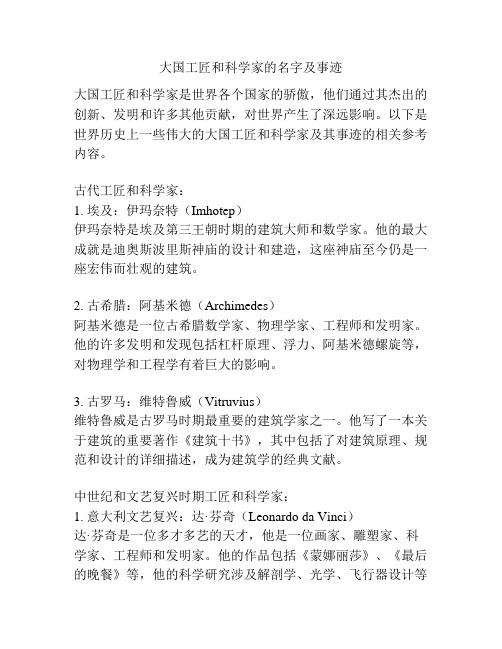
大国工匠和科学家的名字及事迹大国工匠和科学家是世界各个国家的骄傲,他们通过其杰出的创新、发明和许多其他贡献,对世界产生了深远影响。
以下是世界历史上一些伟大的大国工匠和科学家及其事迹的相关参考内容。
古代工匠和科学家:1. 埃及:伊玛奈特(Imhotep)伊玛奈特是埃及第三王朝时期的建筑大师和数学家。
他的最大成就是迪奥斯波里斯神庙的设计和建造,这座神庙至今仍是一座宏伟而壮观的建筑。
2. 古希腊:阿基米德(Archimedes)阿基米德是一位古希腊数学家、物理学家、工程师和发明家。
他的许多发明和发现包括杠杆原理、浮力、阿基米德螺旋等,对物理学和工程学有着巨大的影响。
3. 古罗马:维特鲁威(Vitruvius)维特鲁威是古罗马时期最重要的建筑学家之一。
他写了一本关于建筑的重要著作《建筑十书》,其中包括了对建筑原理、规范和设计的详细描述,成为建筑学的经典文献。
中世纪和文艺复兴时期工匠和科学家:1. 意大利文艺复兴:达·芬奇(Leonardo da Vinci)达·芬奇是一位多才多艺的天才,他是一位画家、雕塑家、科学家、工程师和发明家。
他的作品包括《蒙娜丽莎》、《最后的晚餐》等,他的科学研究涉及解剖学、光学、飞行器设计等领域,对人类的艺术和科学发展产生了重大影响。
2. 德国:约翰内斯·古登堡(Johannes Gutenberg)古登堡是德国文艺复兴时期的发明家,他发明了可移动式印刷术,被认为是现代印刷术的奠基人。
他的发明使书籍的制作更加快速和经济,并推动了信息的广泛传播与思想的自由。
近现代工匠和科学家:1. 英国:詹姆斯·瓦特(James Watt)瓦特是一位苏格兰工程师和发明家,被认为是蒸汽机的改进者和先驱。
他的改进使蒸汽机效率提高,对工业革命产生了深远影响。
2. 美国:托马斯·爱迪生(Thomas Edison)爱迪生是美国发明家和科学家,被尊称为“现代发明之父”。
小鲁班 勤奋和创造力的故事
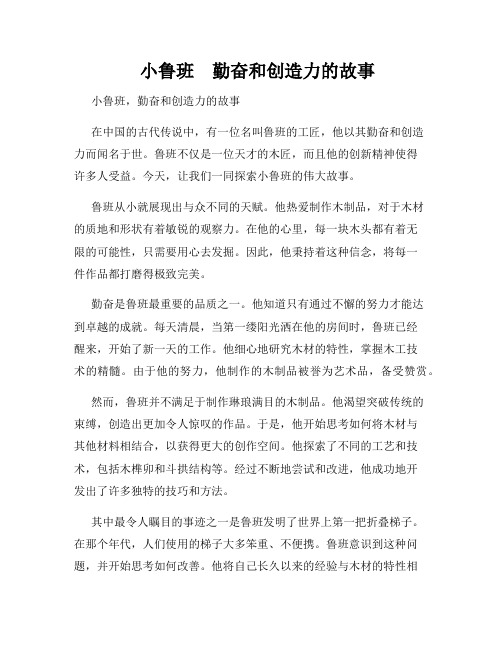
小鲁班勤奋和创造力的故事小鲁班,勤奋和创造力的故事在中国的古代传说中,有一位名叫鲁班的工匠,他以其勤奋和创造力而闻名于世。
鲁班不仅是一位天才的木匠,而且他的创新精神使得许多人受益。
今天,让我们一同探索小鲁班的伟大故事。
鲁班从小就展现出与众不同的天赋。
他热爱制作木制品,对于木材的质地和形状有着敏锐的观察力。
在他的心里,每一块木头都有着无限的可能性,只需要用心去发掘。
因此,他秉持着这种信念,将每一件作品都打磨得极致完美。
勤奋是鲁班最重要的品质之一。
他知道只有通过不懈的努力才能达到卓越的成就。
每天清晨,当第一缕阳光洒在他的房间时,鲁班已经醒来,开始了新一天的工作。
他细心地研究木材的特性,掌握木工技术的精髓。
由于他的努力,他制作的木制品被誉为艺术品,备受赞赏。
然而,鲁班并不满足于制作琳琅满目的木制品。
他渴望突破传统的束缚,创造出更加令人惊叹的作品。
于是,他开始思考如何将木材与其他材料相结合,以获得更大的创作空间。
他探索了不同的工艺和技术,包括木榫卯和斗拱结构等。
经过不断地尝试和改进,他成功地开发出了许多独特的技巧和方法。
其中最令人瞩目的事迹之一是鲁班发明了世界上第一把折叠梯子。
在那个年代,人们使用的梯子大多笨重、不便携。
鲁班意识到这种问题,并开始思考如何改善。
他将自己长久以来的经验与木材的特性相结合,创造出一把可以轻松折叠的梯子。
这个发明不仅帮助了许多人的生活,而且被广泛地应用于日常工作中。
鲁班的创造力也体现在他对细节的关注上。
他相信,一个小小的改变可以产生巨大的效果。
例如,他发现在木制家具的角上加上一些装饰性的雕刻,可以使整个家具变得精致。
他用心地打磨每一个细节,不断地追求完美。
这种追求使得他的作品与众不同,展现出他独特的艺术风格。
小鲁班的勤奋和创造力不仅改变了自己的命运,也影响了后世。
他的精神使人们认识到只有通过不断地努力和创新才能实现突破。
他的作品成为了时代的见证,见证了中国古代工匠的智慧和技艺。
工匠精神名人素材

工匠精神名人素材工匠精神是一种倡导追求卓越、追求完美、注重细节和创新的价值观。
在今天的社会中,这种精神备受推崇,因为它表达了对品质的追求和对个性的认同。
许多名人通过他们对工匠精神的理解、运用和推广,成为人们学习的榜样。
本文将介绍几位具有代表性的工匠精神名人素材,以期能够帮助读者更好地理解并实践工匠精神。
一、达芬奇达芬奇是文艺复兴时期意大利的一位全能天才,他的才华和贡献令人惊叹。
他是一位画家、雕塑家、建筑家、机械师、解剖学家和科学家,他的作品被誉为世界上最伟大的艺术之一,如画作《蒙娜丽莎》、《最后的晚餐》等。
而这一切都源于他的工匠精神。
他注重每一细节,每一个形状和线条都经过了深思熟虑,每一项技术都经过了反复试验。
他将自己的研究、实验和创新结合起来,为人类历史上留下了不可磨灭的贡献。
达芬奇的工匠精神告诉我们,作为一个工匠,我们需要深入探究我们所从事的领域,不断地创新和进步。
二、乔布斯乔布斯是苹果公司的创始人之一,他的名字伴随着苹果公司的辉煌历程一同被人们铭记。
乔布斯一生追求卓越和完美,他注重每一细节,每一个特点都要做到最好。
他追求极致的设计,甚至在苹果的电脑上隐藏了一条线,为了使线条更简洁、美观。
他也深知苹果公司的成功不仅仅靠产品本身,还在于产品品质和用户体验。
他说过一句话:“我们不仅仅是在卖电脑,我们是在卖一种生活方式。
”乔布斯的工匠精神告诉我们,我们应该坚持追求卓越和完美,注重客户的体验,让产品成为人们生活的一部分。
三、玛丽·卡耐基玛丽·卡耐基是20世纪美国最著名的新时代思想家之一,她是全球最畅销的自我帮助类书籍《如何赢友达和影响他人》的作者。
她深信每个人都想获得别人的承认,而这很大程度上取决于我们如何表现自己。
她的书中提出了许多关于人际关系、沟通技巧和管理人员的知识和理论,被称为“赢友达”的方法,被证明具有高度实用性和可操作性。
通过她的书籍,玛丽·卡耐基传授了许多珍贵的工匠技巧,如如何和人沟通、如何揭示心灵、如何关注细节和如何让自己受到尊重。
大国工匠24位人物名言
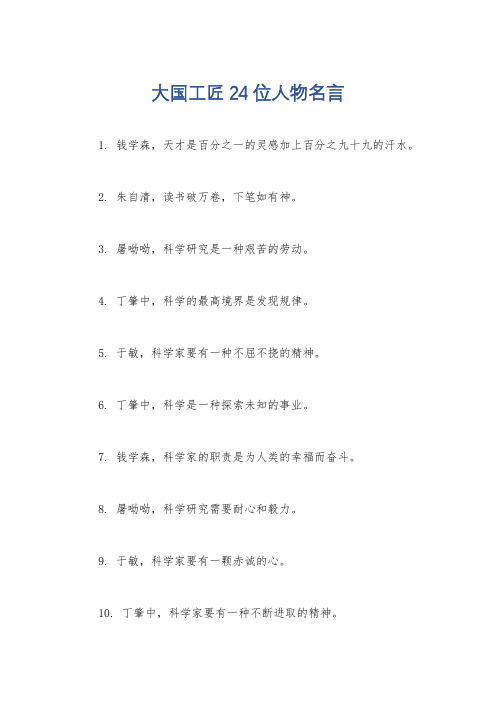
大国工匠24位人物名言
1. 钱学森,天才是百分之一的灵感加上百分之九十九的汗水。
2. 朱自清,读书破万卷,下笔如有神。
3. 屠呦呦,科学研究是一种艰苦的劳动。
4. 丁肇中,科学的最高境界是发现规律。
5. 于敏,科学家要有一种不屈不挠的精神。
6. 丁肇中,科学是一种探索未知的事业。
7. 钱学森,科学家的职责是为人类的幸福而奋斗。
8. 屠呦呦,科学研究需要耐心和毅力。
9. 于敏,科学家要有一颗赤诚的心。
10. 丁肇中,科学家要有一种不断进取的精神。
11. 钱学森,科学是一种寻求真理的事业。
12. 朱自清,读书不觉已春深,一寸光阴一寸金。
13. 屠呦呦,科学研究是一种创造性的工作。
14. 丁肇中,科学家要有一种无私的胸怀。
15. 钱学森,科学是一种不断探索的事业。
16. 朱自清,学而不思则罔,思而不学则殆。
17. 屠呦呦,科学研究需要勤奋和毅力。
18. 丁肇中,科学家要有一种创新的精神。
19. 钱学森,科学是一种追求真理的事业。
20. 朱自清,莫等闲,白了少年头,空悲切。
21. 屠呦呦,科学研究需要耐心和毅力。
22. 丁肇中,科学家要有一种忘我的精神。
23. 钱学森,科学是一种不断探索的事业。
24. 朱自清,不积跬步,无以至千里。
泛读第四册课文翻译
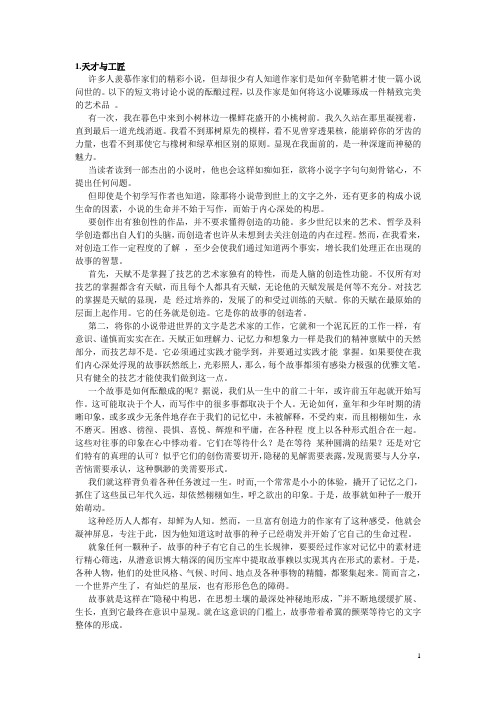
1.天才与工匠许多人羡慕作家们的精彩小说,但却很少有人知道作家们是如何辛勤笔耕才使一篇小说问世的。
以下的短文将讨论小说的酝酿过程,以及作家是如何将这小说雕琢成一件精致完美的艺术品。
有一次,我在暮色中来到小树林边一棵鲜花盛开的小桃树前。
我久久站在那里凝视着,直到最后一道光线消逝。
我看不到那树原先的模样,看不见曾穿透果核,能崩碎你的牙齿的力量,也看不到那使它与橡树和绿草相区别的原则。
显现在我面前的,是一种深邃而神秘的魅力。
当读者读到一部杰出的小说时,他也会这样如痴如狂,欲将小说字字句句刻骨铭心,不提出任何问题。
但即使是个初学写作者也知道,除那将小说带到世上的文字之外,还有更多的构成小说生命的因素,小说的生命并不始于写作,而始于内心深处的构思。
要创作出有独创性的作品,并不要求懂得创造的功能。
多少世纪以来的艺术、哲学及科学创造都出自人们的头脑,而创造者也许从未想到去关注创造的内在过程。
然而,在我看来,对创造工作一定程度的了解,至少会使我们通过知道两个事实,增长我们处理正在出现的故事的智慧。
首先,天赋不是掌握了技艺的艺术家独有的特性,而是人脑的创造性功能。
不仅所有对技艺的掌握都含有天赋,而且每个人都具有天赋,无论他的天赋发展是何等不充分。
对技艺的掌握是天赋的显现,是经过培养的,发展了的和受过训练的天赋。
你的天赋在最原始的层面上起作用。
它的任务就是创造。
它是你的故事的创造者。
第二,将你的小说带进世界的文字是艺术家的工作,它就和一个泥瓦匠的工作一样,有意识、谨慎而实实在在。
天赋正如理解力、记忆力和想象力一样是我们的精神禀赋中的天然部分,而技艺却不是。
它必须通过实践才能学到,并要通过实践才能掌握。
如果要使在我们内心深处浮现的故事跃然纸上,光彩照人,那么,每个故事都须有感染力极强的优雅文笔。
只有健全的技艺才能使我们做到这一点。
一个故事是如何酝酿成的呢?据说,我们从一生中的前二十年,或许前五年起就开始写作。
这可能取决于个人,而写作中的很多事都取决于个人。
工匠精神人物事例
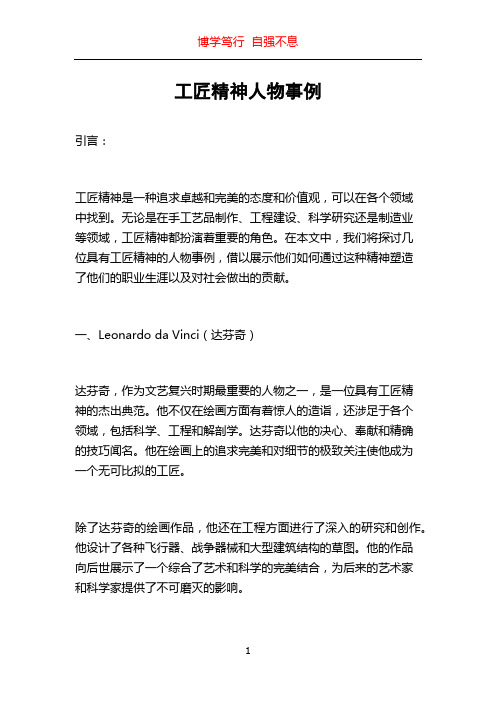
工匠精神人物事例引言:工匠精神是一种追求卓越和完美的态度和价值观,可以在各个领域中找到。
无论是在手工艺品制作、工程建设、科学研究还是制造业等领域,工匠精神都扮演着重要的角色。
在本文中,我们将探讨几位具有工匠精神的人物事例,借以展示他们如何通过这种精神塑造了他们的职业生涯以及对社会做出的贡献。
一、Leonardo da Vinci(达芬奇)达芬奇,作为文艺复兴时期最重要的人物之一,是一位具有工匠精神的杰出典范。
他不仅在绘画方面有着惊人的造诣,还涉足于各个领域,包括科学、工程和解剖学。
达芬奇以他的决心、奉献和精确的技巧闻名。
他在绘画上的追求完美和对细节的极致关注使他成为一个无可比拟的工匠。
除了达芬奇的绘画作品,他还在工程方面进行了深入的研究和创作。
他设计了各种飞行器、战争器械和大型建筑结构的草图。
他的作品向后世展示了一个综合了艺术和科学的完美结合,为后来的艺术家和科学家提供了不可磨灭的影响。
二、Thomas Edison(托马斯·爱迪生)爱迪生是一位传奇般的发明家和商人,他的工匠精神在科学和技术的领域中留下了深远的影响。
作为世界上最具影响力和最成功的发明家之一,爱迪生的发明包括电灯、电话和影片摄影机等重要创新。
爱迪生的工匠精神体现在他对细节的关注和不断改进的态度上。
无论是科学实验室的工作还是实际的发明创造,他都追求卓越和完美。
他的著名名言:“天才是百分之一的灵感加上百分之九十九的汗水”正是他工匠精神的最佳写照。
他的努力和奉献精神影响了整个科学和技术界。
三、Jiro Ono(小野二郎)小野二郎是一位在日本寿司界具有传奇地位的寿司师傅,也是一位全世界公认的工匠。
他追求完美的态度和对细节的极致关注使他的寿司成为了顶级美食。
小野二郎的工匠精神体现在他对寿司制作的无与伦比的专注力上。
他花费数十年的时间研究米饭、鱼、调味品和手艺,以求做出无可挑剔的寿司。
他追求完美的态度不仅体现在食材的选取上,也体现在寿司的造型、口感和服务上。
10大人物工匠精神事迹

10大人物工匠精神事迹工匠精神是一种追求卓越、追求完美的态度和价值观。
在我们的社会中,有许多杰出的人物展现了工匠精神,他们以自己的努力和才华,创造了许多令人惊叹的成就。
以下是10位具有工匠精神的人物事迹。
1. 李宁:作为中国体操运动员,李宁在1984年奥运会上创造了三金的壮举。
他的坚持和努力,展现了工匠精神的力量。
2. 史蒂夫·乔布斯:作为苹果公司的创始人,乔布斯以他的创新和才华,改变了整个科技行业。
他的工匠精神激励了无数人。
3. 爱迪生:作为发明家,爱迪生创造了许多重要的发明,如电灯和电话。
他的坚持和毅力,是工匠精神的典范。
4. 高尔夫·帕尔默:作为高尔夫运动员,帕尔默以他的技术和热情,成为了高尔夫界的传奇人物。
他的工匠精神激励了无数的高尔夫爱好者。
5. 乔治·卢卡斯:作为电影导演,卢卡斯创造了《星球大战》系列电影。
他的创造力和才华,展现了工匠精神的力量。
6. 乔治·华盛顿·卡弗:作为建筑师,卡弗设计了许多世界著名的建筑物,如巴黎的埃菲尔铁塔。
他的工匠精神让他成为了建筑界的传奇。
7. 乔治·克鲁尼:作为演员和导演,克鲁尼以他的才华和专业精神,成为了好莱坞的一颗明星。
他的工匠精神激励了无数的电影人。
8. 乔治·博阿特:作为音乐家,博阿特以他的音乐才华和创造力,成为了古典音乐界的传奇。
他的工匠精神让他的音乐作品流传至今。
9. 乔治·卢卡斯:作为时装设计师,卢卡斯以他的创新和独特的设计风格,成为了时尚界的一颗明星。
他的工匠精神激励了无数的设计师。
10. 乔治·卢卡斯:作为厨师,卢卡斯以他的烹饪技巧和创意,成为了美食界的传奇。
他的工匠精神让他的菜肴成为了人们口中的美味。
这些人物的事迹展示了工匠精神的力量和魅力。
他们以自己的努力和才华,创造了许多令人惊叹的成就。
他们的坚持和毅力,激励了无数的人们追求卓越和完美。
工匠精神是一种宝贵的品质,它不仅能够帮助我们取得成功,还能够让我们的生活更加充实和有意义。
谈谈大国工匠的人物事迹
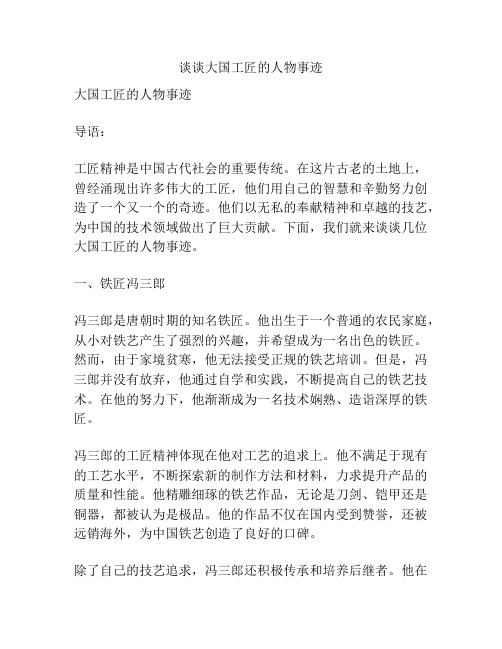
谈谈大国工匠的人物事迹大国工匠的人物事迹导语:工匠精神是中国古代社会的重要传统。
在这片古老的土地上,曾经涌现出许多伟大的工匠,他们用自己的智慧和辛勤努力创造了一个又一个的奇迹。
他们以无私的奉献精神和卓越的技艺,为中国的技术领域做出了巨大贡献。
下面,我们就来谈谈几位大国工匠的人物事迹。
一、铁匠冯三郎冯三郎是唐朝时期的知名铁匠。
他出生于一个普通的农民家庭,从小对铁艺产生了强烈的兴趣,并希望成为一名出色的铁匠。
然而,由于家境贫寒,他无法接受正规的铁艺培训。
但是,冯三郎并没有放弃,他通过自学和实践,不断提高自己的铁艺技术。
在他的努力下,他渐渐成为一名技术娴熟、造诣深厚的铁匠。
冯三郎的工匠精神体现在他对工艺的追求上。
他不满足于现有的工艺水平,不断探索新的制作方法和材料,力求提升产品的质量和性能。
他精雕细琢的铁艺作品,无论是刀剑、铠甲还是铜器,都被认为是极品。
他的作品不仅在国内受到赞誉,还被远销海外,为中国铁艺创造了良好的口碑。
除了自己的技艺追求,冯三郎还积极传承和培养后继者。
他在自家开设了一家铁铺,招收了许多学徒,用自己的经验和知识去指导他们。
他注重培养学徒的创新能力和实际操作技能,使他们能够在铁艺领域有所建树。
通过他的培养,许多学徒成为了优秀的铁匠,为中国的铁艺事业做出了重要贡献。
二、陶工张国栋张国栋是明代时期的陶工。
他生活在一个陶瓷发展蓬勃的时代,但是陶瓷行业一直以来都主要集中在少数几个大窑厂,没有太多机会给普通陶工展示自己的才华。
然而,张国栋并没有因此气馁,他用自己的努力和才华打破了这个瓶颈。
张国栋年轻的时候就表现出了对陶艺的极高天赋。
他热爱陶艺,梦想能够创造出一种独特的陶瓷品种。
然而,由于没有机会接受正统的陶艺教育,他只能凭借自己的努力去探索和研究。
他费尽心思地寻找合适的原料和制作工艺,并进行了大量的试验。
经过多年的努力,终于发明了一种名为“传杯瓶”的陶瓷器具。
这种陶瓷器具不仅外观美观,而且具有很高的实用价值,因此在市场上非常受欢迎。
有工匠精神的人物事迹
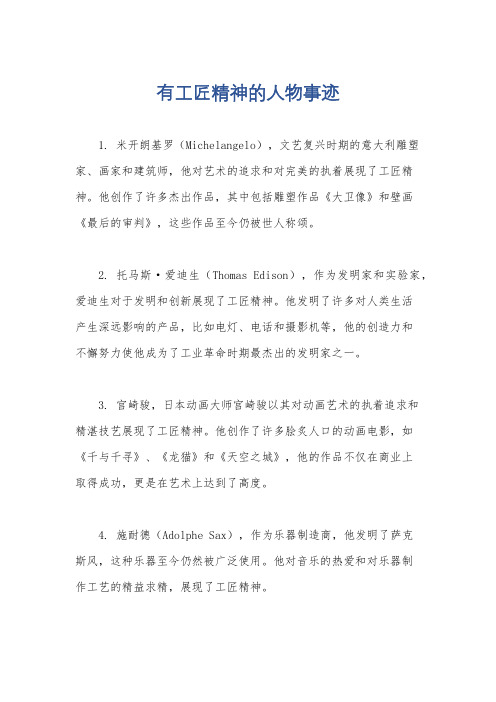
有工匠精神的人物事迹
1. 米开朗基罗(Michelangelo),文艺复兴时期的意大利雕塑家、画家和建筑师,他对艺术的追求和对完美的执着展现了工匠精神。
他创作了许多杰出作品,其中包括雕塑作品《大卫像》和壁画《最后的审判》,这些作品至今仍被世人称颂。
2. 托马斯·爱迪生(Thomas Edison),作为发明家和实验家,爱迪生对于发明和创新展现了工匠精神。
他发明了许多对人类生活
产生深远影响的产品,比如电灯、电话和摄影机等,他的创造力和
不懈努力使他成为了工业革命时期最杰出的发明家之一。
3. 宫崎骏,日本动画大师宫崎骏以其对动画艺术的执着追求和
精湛技艺展现了工匠精神。
他创作了许多脍炙人口的动画电影,如《千与千寻》、《龙猫》和《天空之城》,他的作品不仅在商业上
取得成功,更是在艺术上达到了高度。
4. 施耐德(Adolphe Sax),作为乐器制造商,他发明了萨克
斯风,这种乐器至今仍然被广泛使用。
他对音乐的热爱和对乐器制
作工艺的精益求精,展现了工匠精神。
这些人物都以其对工作的热情、专注和追求卓越的态度展现了工匠精神,他们的事迹激励着世人不断追求卓越,不断创新。
工匠精神的传承和发扬,对于社会的发展和进步具有重要意义。
不是天才,是勤奋 记电信人康伟的工匠精神
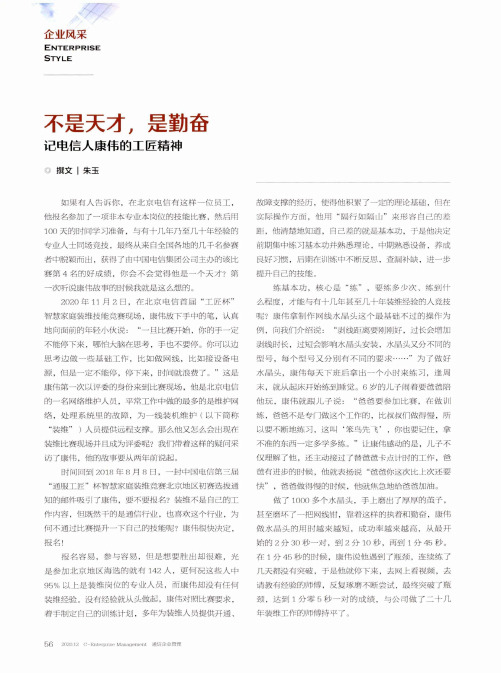
企业风采E n t e r p r i s eS t y l e不是天才,是勤奋记电信人康伟的工匠精神◎撰文I朱玉如果有人告诉你,在北京电信有这样一位员工,他报名参加了一项非本专业本岗位的技能比赛,然后用 100天的时间学习准备,与有十几年乃至几十年经验的 专业人士同场竞技,最终从来自全国各地的几千名参赛 者中脱颖而出,获得了由中国电信集团公司主办的该比 赛第4名的好成绩,你会不会觉得他是一个天才?第 一次听说康伟故事的时候我就是这么想的。
2020年11月2曰,在北京电信首届“工匠杯”智慧家庭装维技能竞赛现场,康伟放下手中的笔,认真 地向面前的年轻小伙说:“一旦比赛幵始,你的手一定 不能停下来,哪怕大脑在思考,手也不要停。
你可以边 思考边做一些基础工作,比如做网线,比如接设备电 源,但是一定不能停,停下来,时间就浪费了。
”这是 康伟第一次以评委的身份来到比赛现场,他是北京电信 的一名网络维护人员,平常工作中做的最多的是维护网 络,处理系统里的故障,为一线装机维护(以下简称 “装维”)人员提供远程支撑。
那么他又怎么会出现在 装维比赛现场并且成为评委呢?我们带着这样的疑问采 访了康伟,他的故事要从两年前说起。
时间回到2018年8月8曰,一封中国电信第三届 “通服工匠”杯智慧家庭装维竞赛北京地区初赛选拔通 知的邮件吸引了康伟,要不要报名?装维不是自己的工 作内容,但既然干的是通信行业,也喜欢这个行业,为 何不通过比赛提升一下自己的技能呢?康伟很快决定,报名!报名容易,参与容易,但是想要胜出却很难,光 是参加北京地区海选的就有142人,更何况这些人中 95%以上是装维岗位的专业人员,而康伟却没有任何 装维经验。
没有经验就从头做起,康伟对照比赛要求,着手制定自己的训练计划,多年为装维人员提供幵通、故障支撑的经历,使得他积累了一定的理论基础,但在 实际操作方面,他用“隔行如隔山”来形容自己的差 距,他清楚地知道,自己差的就是基本功,于是他决定 前期集中练习基本功并熟悉理论,中期熟悉设备,养成 良好习惯,后期在训练中不断反思,查漏补缺,进一步 提升自己的技能。
工匠精神八个人物事迹

工匠精神八个人物事迹鲁班:木工传奇鲁班,那可是木工界的大神啊!他的故事就像传奇一样在民间流传。
有一次,鲁班在山上砍树,那时候砍树可不容易,全靠斧子一下一下地砍。
他砍得大汗淋漓,可效率不高。
突然,他被一种草划伤了手,一般人可能就揉揉手,骂几句就算了。
可鲁班不,他仔细观察这草,发现草边缘有好多小锯齿。
他眼睛一下子亮了起来,就像发现了宝藏。
他想啊,要是把这种锯齿形状用到砍树工具上,那得多省力。
于是,他就开始尝试,反复琢磨怎么把锯齿做得合适。
经过无数次的试验,锯子就诞生啦!这锯子可不得了,大大提高了木工们干活的效率。
鲁班对木工活儿的钻研,那就是工匠精神,不放过任何一个小细节,把日常的问题变成创造的灵感。
庖丁:解牛高手庖丁解牛的故事大家都听过吧。
庖丁那可真是个厉害的屠夫,他宰牛的时候,动作就像跳舞一样优美。
别人宰牛,那是又费力又费刀,可庖丁不一样。
他对牛的身体结构熟悉得就像熟悉自己的家一样。
有一回,大家都围在一旁看他解牛。
他拿着刀,手起刀落,每一刀都精准无比。
他的眼睛就像扫描仪一样,能看穿牛的骨头和肌肉之间的缝隙。
只见他的刀在牛的身体里游走,“刷刷刷”,那声音有节奏得就像音乐。
一会儿工夫,一头牛就被他分解得干干净净,而且他的刀还锋利如初呢。
这是为啥?因为他多年来一直专注于解牛这件事,不断摸索牛的身体奥秘,用心去感受每一次下刀的位置。
他的这种专注和对技艺的精研,就是工匠精神,把看似普通的工作做到了极致。
蔡伦:造纸大师蔡伦改进造纸术,这可是个了不起的事儿。
在蔡伦之前,人们写字用的东西可麻烦啦,要么是竹简,又重又不方便;要么是丝绸,太贵了。
蔡伦就琢磨,能不能找到一种更合适的材料来造纸呢?他到处寻找原料,尝试各种方法。
有一次,他看到一些破渔网、麻头之类的东西被扔在角落里,就像垃圾一样。
可他没嫌弃,把这些东西收集起来。
然后他开始尝试把这些东西弄碎、煮烂,再经过一系列复杂的工序。
这个过程可不容易,就像在黑暗中摸索一样,失败了好多回。
天才与巨匠读后感
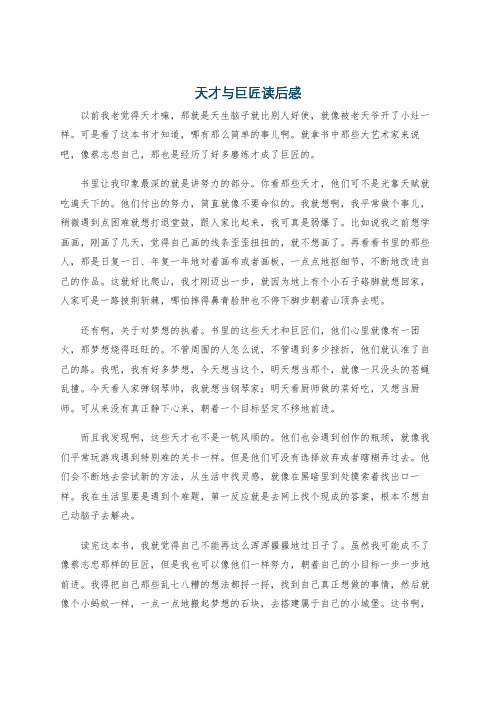
天才与巨匠读后感以前我老觉得天才嘛,那就是天生脑子就比别人好使,就像被老天爷开了小灶一样。
可是看了这本书才知道,哪有那么简单的事儿啊。
就拿书中那些大艺术家来说吧,像蔡志忠自己,那也是经历了好多磨练才成了巨匠的。
书里让我印象最深的就是讲努力的部分。
你看那些天才,他们可不是光靠天赋就吃遍天下的。
他们付出的努力,简直就像不要命似的。
我就想啊,我平常做个事儿,稍微遇到点困难就想打退堂鼓,跟人家比起来,我可真是弱爆了。
比如说我之前想学画画,刚画了几天,觉得自己画的线条歪歪扭扭的,就不想画了。
再看看书里的那些人,那是日复一日、年复一年地对着画布或者画板,一点点地抠细节,不断地改进自己的作品。
这就好比爬山,我才刚迈出一步,就因为地上有个小石子硌脚就想回家,人家可是一路披荆斩棘,哪怕摔得鼻青脸肿也不停下脚步朝着山顶奔去呢。
还有啊,关于对梦想的执着。
书里的这些天才和巨匠们,他们心里就像有一团火,那梦想烧得旺旺的。
不管周围的人怎么说,不管遇到多少挫折,他们就认准了自己的路。
我呢,我有好多梦想,今天想当这个,明天想当那个,就像一只没头的苍蝇乱撞。
今天看人家弹钢琴帅,我就想当钢琴家;明天看厨师做的菜好吃,又想当厨师。
可从来没有真正静下心来,朝着一个目标坚定不移地前进。
而且我发现啊,这些天才也不是一帆风顺的。
他们也会遇到创作的瓶颈,就像我们平常玩游戏遇到特别难的关卡一样。
但是他们可没有选择放弃或者瞎糊弄过去。
他们会不断地去尝试新的方法,从生活中找灵感,就像在黑暗里到处摸索着找出口一样。
我在生活里要是遇到个难题,第一反应就是去网上找个现成的答案,根本不想自己动脑子去解决。
读完这本书,我就觉得自己不能再这么浑浑噩噩地过日子了。
虽然我可能成不了像蔡志忠那样的巨匠,但是我也可以像他们一样努力,朝着自己的小目标一步一步地前进。
我得把自己那些乱七八糟的想法都捋一捋,找到自己真正想做的事情,然后就像个小蚂蚁一样,一点一点地搬起梦想的石块,去搭建属于自己的小城堡。
天才处于合适的位置才能成为天才作文

天才处于合适的位置才能成为天才作文全文共8篇示例,供读者参考篇1我的很多朋友也许都梦想着自己将来能成为天才,成为那些在历史上留下伟大足迹的人物。
可是大家有没有想过,天才是不是真的那么光鲜亮丽呢?首先,我们得搞清楚什么是天才。
天才就是那些在某一领域表现特别出色、超越常人的人。
比如说,爱因斯坦是物理学天才,莎士比亚是文学天才,贝多芬是音乐天才。
他们都是因为在自己的专业领域做出了巨大贡献而被后人铭记的。
不过光是有天分是不够的,光有"天"还不够,还得有"才"。
像爱因斯坦虽然从小就展现出过人的数理天赋,但他之所以能成为世界级的科学家,更重要的是他勤奋好学、不屈不挠的品格。
莎士比亚从小就热爱诗词,但要成为一代文曲星,他也下了苦功夫。
贝多芬虽然天生对音乐有着惊人的天分,但他从小就卯足了劲学习音乐知识和技巧。
我们可以看到,这些天才都是在合适的时间、合适的地点、合适的环境里被发掘和培养出来的。
如果让他们生活在一个艺术文化不发达的国度或者一个战乱不断的年代,他们很可能就渺无音讯了。
就好像一棵参天大树,即使有再好的种子,如果栽在荒漠里,它也长不大。
换句话说,天才之所以能成为天才,是因为他们生活在了一个适合发展自己才华的环境里。
爱因斯坦如果生在中世纪,当时的科学几乎停滞不前,他很可能就默默无闻了。
莎士比亚如果生在文盲遍地的时代,他的文学才华也难以施展。
贝多芬如果出生在重视农耕而不重视音乐的部落,他的天赋恐怕也就被埋没了。
我们再举一个栗子。
北宋有位写诗人杜荀鹤,他从小就被誉为"神童"。
他10 岁就能写出惊世骇俗的佳作,堪称天才少年。
可惜,他运气不佳,活在动荡不安的战乱年代,最终英年早逝,成就卓著却毁于一旦。
如果他生在和平年代,或许就能创造出更多的不朽名篇了。
不过我也想到,虽然环境的确很重要,但我们自己的主观努力同样关键。
毕竟,世界上也有不少"隐形的天才",他们虽然生活环境并不太理想,但依然凭借自身的不懈努力,创造出了惊天地、泣鬼神的作品。
工匠主要事迹
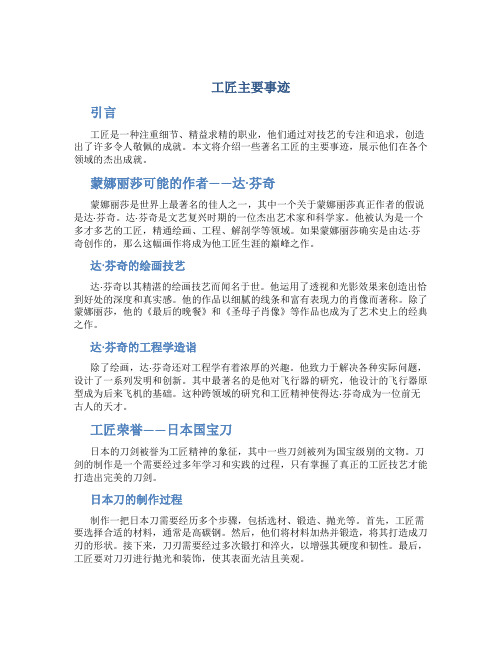
工匠主要事迹引言工匠是一种注重细节、精益求精的职业,他们通过对技艺的专注和追求,创造出了许多令人敬佩的成就。
本文将介绍一些著名工匠的主要事迹,展示他们在各个领域的杰出成就。
蒙娜丽莎可能的作者——达·芬奇蒙娜丽莎是世界上最著名的佳人之一,其中一个关于蒙娜丽莎真正作者的假说是达·芬奇。
达·芬奇是文艺复兴时期的一位杰出艺术家和科学家。
他被认为是一个多才多艺的工匠,精通绘画、工程、解剖学等领域。
如果蒙娜丽莎确实是由达·芬奇创作的,那么这幅画作将成为他工匠生涯的巅峰之作。
达·芬奇的绘画技艺达·芬奇以其精湛的绘画技艺而闻名于世。
他运用了透视和光影效果来创造出恰到好处的深度和真实感。
他的作品以细腻的线条和富有表现力的肖像而著称。
除了蒙娜丽莎,他的《最后的晚餐》和《圣母子肖像》等作品也成为了艺术史上的经典之作。
达·芬奇的工程学造诣除了绘画,达·芬奇还对工程学有着浓厚的兴趣。
他致力于解决各种实际问题,设计了一系列发明和创新。
其中最著名的是他对飞行器的研究,他设计的飞行器原型成为后来飞机的基础。
这种跨领域的研究和工匠精神使得达·芬奇成为一位前无古人的天才。
工匠荣誉——日本国宝刀日本的刀剑被誉为工匠精神的象征,其中一些刀剑被列为国宝级别的文物。
刀剑的制作是一个需要经过多年学习和实践的过程,只有掌握了真正的工匠技艺才能打造出完美的刀剑。
日本刀的制作过程制作一把日本刀需要经历多个步骤,包括选材、锻造、抛光等。
首先,工匠需要选择合适的材料,通常是高碳钢。
然后,他们将材料加热并锻造,将其打造成刀刃的形状。
接下来,刀刃需要经过多次锻打和淬火,以增强其硬度和韧性。
最后,工匠要对刀刃进行抛光和装饰,使其表面光洁且美观。
刀剑工匠的精神制作日本刀需要极高的专注力和技巧。
刀剑工匠经过多年的学习和实践,才能掌握精湛的技艺。
他们追求每一把刀剑的完美,注重细节和质量。
科学家和工匠精神作文
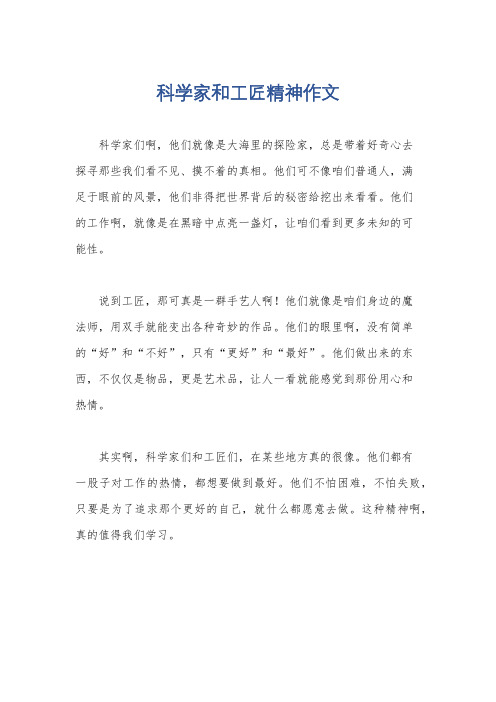
科学家和工匠精神作文
科学家们啊,他们就像是大海里的探险家,总是带着好奇心去
探寻那些我们看不见、摸不着的真相。
他们可不像咱们普通人,满
足于眼前的风景,他们非得把世界背后的秘密给挖出来看看。
他们
的工作啊,就像是在黑暗中点亮一盏灯,让咱们看到更多未知的可
能性。
说到工匠,那可真是一群手艺人啊!他们就像是咱们身边的魔
法师,用双手就能变出各种奇妙的作品。
他们的眼里啊,没有简单
的“好”和“不好”,只有“更好”和“最好”。
他们做出来的东西,不仅仅是物品,更是艺术品,让人一看就能感觉到那份用心和
热情。
其实啊,科学家们和工匠们,在某些地方真的很像。
他们都有
一股子对工作的热情,都想要做到最好。
他们不怕困难,不怕失败,只要是为了追求那个更好的自己,就什么都愿意去做。
这种精神啊,真的值得我们学习。
- 1、下载文档前请自行甄别文档内容的完整性,平台不提供额外的编辑、内容补充、找答案等附加服务。
- 2、"仅部分预览"的文档,不可在线预览部分如存在完整性等问题,可反馈申请退款(可完整预览的文档不适用该条件!)。
- 3、如文档侵犯您的权益,请联系客服反馈,我们会尽快为您处理(人工客服工作时间:9:00-18:30)。
So it is with the reader who comes upon an outstanding story: spellbound, he takes it to his heart, no question asked.
首先,天赋不是掌握了技艺的艺术家独有的特性,而是人脑的创造性功能。不仅所有对技艺的掌握都含有天赋,而且每个人都具有天赋,无论他的天赋发展是何等不充分。对技艺的掌握是天赋的显现,是 经过培养的,发展了的和受过训练的天赋。你的天赋在最原始的层面上起作用。它的任务就是创造。它是你的故事的创造者。
Second, the body of words that carries your story into the world is the work of the craftsman's labor, which is as conscious, as canny, and as practical as that of the bricklayer. While genius is a natural part of our mental equipment, like perception, memory, and imagination, craftsmanship is not. It must be learned. It is learned by practice, and by practice it is mastered. If the stories that rise within us are to emerge and flourish, each must be provided with a strong, handsome body of words, and only sound craftsmanship can provide this.
How is a story conceived? It is said that we write from the first twenty years of our lives, perhaps from the first five; it may depend on the individual, as so much does in writing. In any case, the lucid impressions of childhood and early youth, more or less unconditioned, unexplained, unchecked, lie in the memory, live and timeless. Enigma, wonder, fear, rapture, grandeur, and trivia in every degree and combination, these early impressions throb and wait for what? Completion of some kind? For recognition of their own peculiar truth? It would seem their wounds want lancing; their secret knowledge wants telling; the discoveries would be shared, and woes admitted, and the airy tracery of beauty given form.
我们就这样背负着各种任务渡过一生。时而,一个常常是小小的体验,撬开了记忆之门,抓住了这些虽已年代久远,却依然栩栩如生,呼之欲出的印象。于是,故事就如种子一般开始萌动。
This happens to everyone and more often than is known. But there are times when it happens to the creative writer and causes him to catch his breath because he knows that the seed of a story has quickened and has begun a life of its own.
这种经历人人都有,却鲜为人知。然而,一旦富有创造力的作家有了这种感受,他就会凝神屏息,专注于此,因为他知道这时故事的种子已经萌发并开始了它自己的生命过程。
Like any seed, the seed of a story has its own principle of growth which employs a process of intelligent selection, drawing from the unconscious mind's vast treasury of experience that it needs to fulfill its inherent form: there come together people and their ways, with weather and times and places, and the souls of things. In short, there is produced a world, complete with stars and stumbling blocks.
一个故事是如何酝酿成的呢?据说,我们从一生中的前二十年,或许前五年起就开始写作。这可能取决于个人,而写作中的很多事都取决于个人。无论如何,童年和少年时期的清晰印象,或多或少无条件地存在于我们的记忆中,未被解释,不受约束,而且栩栩如生,永不磨灭。困惑、徬徨、畏惧、喜悦、辉煌和平庸,在各种程度上以各种形式组合在一起。这些对往事的印象在心中悸动着。它们在等待什么?是在等待 某种圆满的结果?还是对它们特有的真理的认可?似乎它们的创伤需要切开,隐秘的见解需要表露,发现需要与人分享,苦恼需要承认,这种飘渺的美需要形式。
当读者读到一部杰出的小说时,他也会这样如痴如狂,欲将小说字字句句刻骨铭心,不提出任何问题。
But even the beginning writer knows there is more to a story's life than the body of words which carries it into the world, and that it does not begin with writing, but with conception in the dark of the mind.
第二,将你的小说带进世界的文字是艺术家的工作,它就和一个泥瓦匠的工作一样 ,有意识、谨慎而实实在在。天赋正如理解力、记忆力和想象力一样是我们的精神禀赋中的天然部分,而技艺却不是。它必须通过实践才能学到,并要通过实践才能掌握。如果要使在我们内心深处浮现的故事跃然纸上,光彩照人,那么,每个故事都须有感染力极强的优雅文笔。只有健全的技艺才能使我们做到这一点。
但即使是个初学写作者也知道,除那将小说带到世上的文字之外,还有更多的构成小说生命的因素,小说的生命并不始于写作,而始于内心深处的构思。
It is not necessary to understand the creative function in order to produce original work. Centuries of art, philosophy and science have emerged from the minds of people who may not even have suspected the inner process. It seems to me, however, that at least a degree of understanding of the creative event increases our wisdom in dealing with the emerging story by making us aware of two things.
Thus variously laden we move through life, and now and then an experience, often slight, prices the memory and seizes upon one of those live, expectant impressions of long age, and a quickening1 takes place.
Many people admire writers for their exquisite stories, but few of them know with what painstaking efforts writers work to bring a story into the world. The following essay discusses the process of conceiving a story and developing it into a perfect work of art.
许多人羡慕作家们的精彩小说,但却很少有人知道作家们是如何辛勤笔耕才使一篇小说问世的。以下的短文将讨论小说的酝酿过程,以及作家是如何将这小说雕琢成一件精致完美的艺术品。
Once on the edge of a woods at twilight I came upon a small peach tree in flower. I stayed there watching until the light was gone. I saw nothing of the tree's origin, nothing of the might which had forced open a pit you could break your teeth on, and nothing of the principle which held it separate from the oaks and the grasses. All that appeared to me was a profound and eerie grace.
